
Monday, June 30, 2008
Rabbi Abraham Twerski on Nachum Segal Radio Tue July 1

Coming This Fall - Do-It-Yourself Traditions!
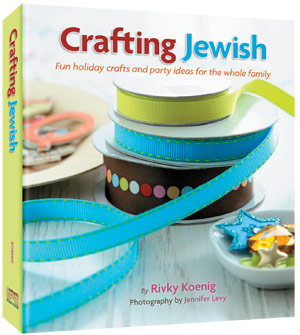 Here's a totally unique new resource for creating handmade and homemade traditions that you and yours will treasure for years. Crafting Jewish features fun holiday crafts and party ideas for the whole family. It has been designed both for experienced crafters looking for creative and unusual ideas and for beginners just starting to discover the joys of crafts.
Here's a totally unique new resource for creating handmade and homemade traditions that you and yours will treasure for years. Crafting Jewish features fun holiday crafts and party ideas for the whole family. It has been designed both for experienced crafters looking for creative and unusual ideas and for beginners just starting to discover the joys of crafts.This book has it all!
- Over 120 holiday and everyday projects, each with step-by-step instructions
- Stunning full-color photos of every craft
- Distinctive ideas for holiday get-togethers - many with delicious recipes
- Pictorial reference guide of crafting tools and product buying guide
- Full-size templates and comprehensive index
Look for Crafting Jewish this fall. And - you can actually pre-order your copy now!
News Flash - Another Milestone in Jewish Literary History Achieved
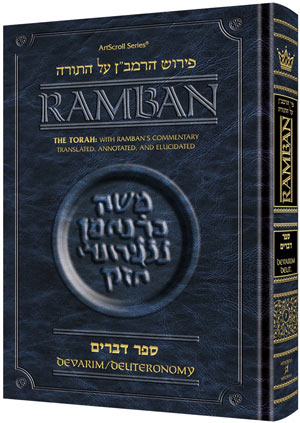
Inside ArtScroll -- Week of June 30 08
There’s the Sapirstein edition of the Torah with Rashi’s commentary, published in 17 pocket-size small volumes. Each one is small enough to fit into a pocket or purse, yet easy to read, with all the features of the full-size edition.
The Stone Chumash is the world's most popular edition of the Torah with English translation and commentary. ArtScroll offers a small, five-volume edition of the Stone Chumash that is comfortable on the eyes – yet each volume takes so little space to carry.
During the summer months we review the tractate of Pirke Avos, the Ethics of the Fathers. ArtScroll recommends our small three-volume edition of this ethical gem with the commentary of Rabbi Moshe Lieber. Each volume is just 4”x6” and so easy to take with you.
Saying Tehillim, the book of Psalms – today it’s so important. And all the more so to say Tehillim with understanding. We’ve published a five-volume mini-edition of Rabbi Avraham Chaim Feuer’s outstanding commentary on Tehillim. Brimming with over 2,000 years of rabbinic insight and perspectives on the Psalms, this travel-size edition is ideal for car or office – perfect for filling a few free minutes with meaning, reflection, and prayer.
ArtScroll’s Yad Avrohom edition of the Mishnah has been years in the making. Five of the six sedarim are complete and the final one – Seder Tohoros – will soon be concluded. Beside the popular full-size edition of the Mishnah, you can purchase a travel version of each Seder, stored in its own boxed set, which includes the commentary of the Rav. Just slip a volume into your pocket or briefcase. Now you can make a siyum on a tractate anywhere – or just stay current with your seder limud. And for Gemara on the go, check out the Travel Edition of the Schottenstein Talmud Bavli.
Here’s a triple header for your portable library – a travel-size edition of the Schottenstein Interlinear Weekday Siddur (Ashkenaz or Sefard), the Interlinear Shabbos Siddur (Ashkenaz or Sefard), and the Interlinear Sefer Tehillim. Small in size yet big in value, interlinear is the ideal format for those who appreciate having an English translation immediately under the Hebrew text.
Tzipi Caton of Miracle Ride Featured on Aish.com

Aish.com is the online educational weekly magazine of Aish HaTorah and claims a subscriber base of over 260,000 readers and receives over 2,000,000 visitors monthly.
Originally written as a journal, Miracle Ride is the true story of a teenage girl's grim diagnosis with cancer, her remarkable recovery, and her extraordinary new life afterward. (See book review in this blog.)
Five Towns Jewish Times Reviews "A Mother's Musings"
Here's a link to A(nother) Mother's Musings as featured in the Five Towns Jewish Times. Click HERE.
Also, we've included a previous review of A Mother's Musings here on the Inside ArtScroll Blog, viewable HERE.
Monday, June 23, 2008
Inside ArtScroll - Week of June 23 08
Fuel For Your
1. Standing Up While Doing Mitzvos
2. Getting Paid for Mitzvos
3. The Bracha on a Mitzvah: When?
4. Distractions When Performing A Mitzvah
1. Dishwasher on Shabbos
2. A Manicure on Shabbos?
3. Birthday Cakes on Shabbos
4. Hairbrushes on Shabbos - Permitted or Not?
1. Singing During Davening: Pro or Con
2. Standing During Davening
3. Proper Attire for Davening
4. Davening Out Loud?
1. My Father's Chumros
2. Can A Father Be Mochel?
3. Can You Sue Your Father?
4. Father or Grandfather: Who Do You Honor?
Rabbi Frand has produced scores of practical, topical audio lectures in his Commuter Chavrusa series, available at your local Hebrew bookseller or through ArtScroll.com.
ArtScroll also offers 17 different sets of shiurim on CD by Rabbi Yisroel Reisman, including his very popular Pathways through the Prophets series, which include fascinating discussions of historical and contemporary issues. Over 1000 people attend his weekly lectures in person, and hundreds more watch them via closed circuit tv in other cities.
Another brilliant audio series is The Maggid Speaks, featuring Rabbi Paysach Krohn's inspiring and popular public lectures.
Torah learners who are MP3-enabled can stay current with Rabbi Saul Rosenberg's lessons on Rashi's Commentary on Chumash. Bereishis/Genesis, Shemos/Exodus, and Vayikra/Leviticus are currently available.
Many ArtScroll Audio shiurim are available on cassettes, as well. Check with your local Hebrew bookseller or consult the latest ArtScroll catalogue for a complete description of tape inventory.
A Summer Reading Recommendation! Libby Lazewnik's latest novel Fortune Seekers is climbing the charts. Set in the remote town of
Friday, June 20, 2008
A Review of Rabbi Abraham Twerski's The Shabbos Companion, Vols. I & II
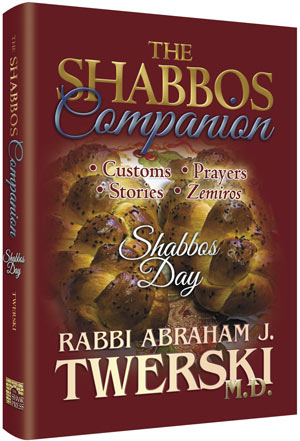
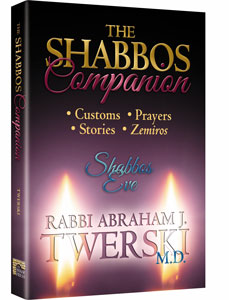
Reviewed by Ariella Marcus
The Shabbos Companion reflects that encompassing embrace of Shabbos. Wherever a person may be in his/her Torah literacy and observance, these two well-crafted books will meet a person where s/he is, offering illumination of the mind and elevation of the spirit.
ArtScroll Shaar Press, $21.99/each, Hardcover
See Table of Contents and sample pages of Volume One here.
See Table of Contents and samples pages of Volume Two here.
See a complete listing of Rabbi Twerski's published works from ArtScroll here.
Thursday, June 19, 2008
Coming This Summer - the Kleinman Edition of the Kitzur Shulchan Aruch

The essential laws for observant Jewish living are presented succinctly in the Kitzur Shulchan Aruch, a classic digest of the more massive four-volume Code of Jewish Law. Since Rav Shlomo Ganzfried published the first Kitzur in the 1860’s, this classic has gone through numerous editions. ArtScroll is preparing an unprecedentedly clear and thorough treatment of the "Kitzur." It has the familiar phrase-by-phrase elucidation and commentary that have made the Schottenstein Talmud and the Sapirstein Rashi so popular. In addition, it includes rulings from the Mishnah Berurah and Harav Moshe Feinstein when they differ from the Kitzur. The first book in this multi-volume series (simanim 1-34) will be released this summer. The ArtScroll Kitzur Shulchan Aruch is being produced by a team of dedicated Torah scholars, under the direction of Rabbi Yosaif Asher Weiss, who is also the editor of the Daily Dose of Torah series. The project is dedicated by Brochie and Elly Kleinman, who are the patron dedicators of the Daily Dose of Torah series.
Tuesday, June 17, 2008
What's a Page of Rashi's Commentary Look Like in the Sapirstein Edition?
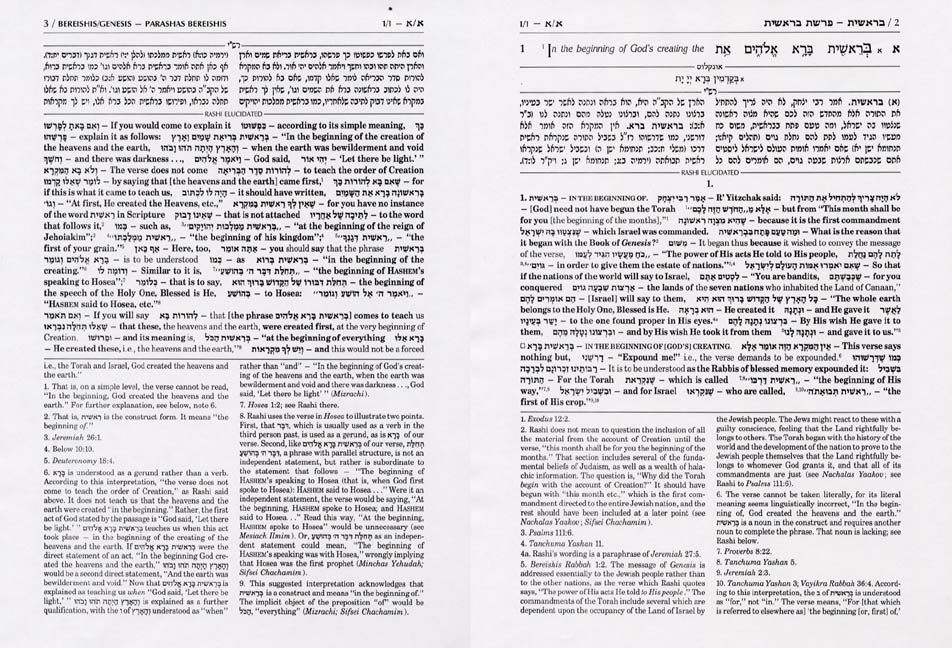
New ArtScroll Catalog Available
Monday, June 16, 2008
Inside ArtScroll - Week of June 16 08
The conclusion of the Yad Avraham Mishnah Series draws near with the publication of Mishnah Niddah. Only a few volumes remain to complete Seder Tahoros, the final Seder in the project. The translation, elucidation, and commentary contained in the series is unparalleled. The completed Sedarim of Zeraim, Moed, Nezikin, Nashim, and Kodashim are all available now in both the full-size and the new pocket-size, boxed sets of Mishnayos. And right now – during the June 20% off sale – is the perfect time to update your Mishnah library with this and other volumes.
The Editor’s View is an eye-opening look at our life, our beliefs, and ourselves as reflected through the eyes of Rabbi Pinchos Lipshutz, editor of the very popular Yated Neeman weekly.Comprising a collection of more than fifty incisive and illuminating essays, this book probes current events, history, and our everyday lives to help us understand the story behind the story – and the important lessons within the story. A student of many leading Torah giants and an original thinker,Rabbi Lipshutz’s perspective on contemporary issues combines the Torah wisdom of his mentors with cogent analysis. It’s all here in The Editor’s View.
Thursday, June 12, 2008
A Teenage Girl, a Grim Diagnosis, and a Storybook Ending
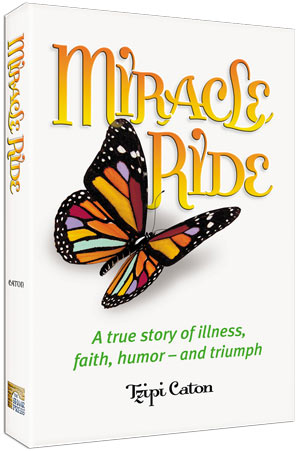
Reviewed by Ariella Marcus
Miracle Ride begins in 2003. Tzipi remembers, “The first thing that went through my mind was that I must’ve had a brick in my neck. It was Thursday, at the end of first period, and I was bending down to get my siddur, when suddenly it hurt to move my head. Instinctively, my hands went to my neck and I felt two big bumps I’d never felt before.”
Tzipi’s spirited attitude, which suffuses the book, emerges in the first chapter when she quips, “Eleventh grade was so not a picnic.” She describes her joy at being a Jewish girl – until she hit a hard wall of realization. “I was a JAP. I was the girl who loved everything about being a girl. The clothing, the shoes, the makeup, the shoes, the accessories, the shoes, the jewelry, the shoes, doing my long dark hair, the shoes, and did I mention the shoes? My days as a JAP seemed to be changing into my days as a JACP. A Jewish American Princess turning into a Jewish American Cancer Patient.”
The story races rollercoaster-like through the shock of diagnosis, the search for the best medical care, the awkward agonies of chemotherapy, the struggle for normalcy, the curious fraternity shared by fellow cancer patients, and a family and community that prays, cares, and wonders why. After many poignant twists and turns, the book hurtles toward an amazing-but-true story book ending which left this reviewer breathless with gratitude.
Miracle Ride is one of those once-in-a-decade books that pole-vaulted to the top of my recommended reading stack. Its particular Jewish cultural and religious setting is a stimulating backdrop for its universal themes of hope, courage, faith, and determination. I got very attached to the personalities showcased in Tzipi’s journal. They enlightened my mind and deeply touched my heart. More than an entertaining human drama, Miracle Ride solicits action. When I reluctantly finished it, I knew I had to carry its impact into my world to make something better, to brighten someone’s day, to improve myself as a caring person.
There’s a compassionate spin-off developing with the publication of Miracle Ride. Friends, family, friends of friends and even strangers are committing resources to make this book available as an encouragement to cancer patients across the country. There is also hope that the book will generate more interest and support for Dr. Michael Harris’ vital work at Tomorrow’s Children’s Institute.
It’s been five years since Tzipi Caton’s miracle ride began. Today at 21, she’s a remarkable soul with a unique gift to reframe personal hardships into a storyline that can literally shift a reader’s view of what’s really important in life. She’s anything but shy in sharing the lessons of her recovery from cancer. Therefore, I predict we’ll see more published musings from this talented young author.
Hear Tzipi Caton's radio interview. See the audio section in the left column of this page.
View Table of Contents and Sample Pages here.
Visit Tzipi Caton's blog here.
Reviewer: Ariella.Marcus@gmail.com
Columnist’s New Book Serves Up Motherhood on Wry
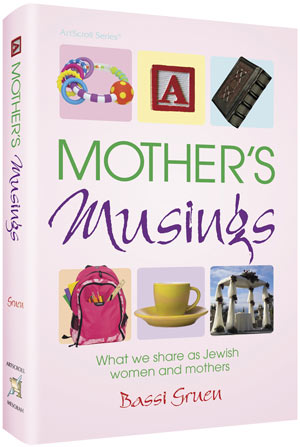
Author Interview: Project Y.E.S. Director Publishes Straight Talk Book on Parenting
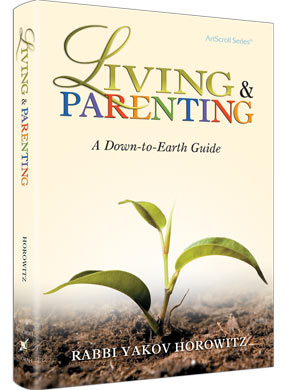
Rabbi Yakov Horowitz is the dean of Yeshiva Darchei Noam in Monsey and the director of the Agudath Israel's Project Y.E.S. (Youth Educational Services). He recently published Living & Parenting: A Down-to-Earth Guide, his first book with ArtScroll Mesorah Publications, which features some of his best, most pragmatic solutions for helping all of today's Jewish youth – mainstream and at-risk – maximize their potential. For over 25 years, he has specialized in reaching out to marginalized Jewish youth and assisting their parents in raising them effectively. His results have been significant and some former students have admitted "this rabbi saved my life". He spoke to broadcaster Gavriel Aryeh Sanders in this exclusive first-person interview.
GS: Rabbi Horowitz, every book has a process of germination. What was yours for Living & Parenting?
RYH: It wasn’t so sophisticated, actually. I've published numerous articles over the years on the subjects of parenting, education and dealing with pre-risk/at-risk youth. I felt that presenting the most practical ones in a single volume would help parents raise their children more effectively.
GS: What’s the meaning behind the title of "Living & Parenting"?
RYH: Parenting is really a reflection of our own lives, as all-too-often, the challenges that we face with our children are really related to issues that we face as adults. I wanted to address the bigger picture and help parents, along with educators, improve their quality of life while equally helping them help their kids do the same.
This book is all about helping parents think outside the box and develop a multitude of approaches and solutions to child rearing. Using a tool analogy, if all you have is a hammer, then everything looks like a nail. My goal is to give students, parents, and teachers more tools to manage their lives better.
GS: You started out at 22 years old teaching a weaker class of eighth grade boys. Did you know what you were getting into?
RYH: Colleagues said I'd be pigeon-holing myself, that I'd never get a strong class. But the naiveté of my youth worked to my benefit. I believed I could do it. More importantly, I believed the kids themselves could rise to my level of expectation. It often took some individualized and unique approaches, but they were often effective with children who had never previously succeeded in school.
GS: How so?
RYH: Rabbi Abraham Twerski told me years ago that spiritual health is invariably linked to healthy self-esteem and conversely that spiritual deficiency was linked to weak self-esteem. Poorly performing students tend to have pretty low self-esteem; they don't easily trust authority figures, either. I took the approach of empowering my students with incremental successes which affected their educational, social, and familial worlds. I remember one case where I inherited a new class. Nice kids but very passive; lots of quiet desperation in their lives. My first action was to take them outside for a spontaneous half-hour of baseball. That earned me the right to hold their attention on matters of learning.
GS: What is your approach to learning, especially Talmudic skills?
RYH: You said the right word. It's skill-based. Many kids today are in "sink or swim" mode. They don't have a solid foundation in the essentials of understanding language, which is the key to understanding thought and meaning! This applies to Gemara, Chumash, even the Siddur. The bright ones figure it out; the average ones lope along; and the rest sink into a malaise of despair, always running but never catching up until at some point, they start dropping out of the race. Adults may view it as defiance; I view it as exhaustion. I've worked hard to create systematic, consecutive, and success-based steps which have kids smiling to themselves. Early on in our learning, they sense that I believe they can do it. The tipping point occurs when they believe they can do it.
GS: How did you structure Living & Parenting?
RYH: As I said, it's a compilation of articles I've authored over the years. There are 50 chapters, many quite brief. Each was selected for relevance to our contemporary challenges in raising kids to become bnei Torah. Two chapters comprise a checklist to determine if sending your teen to learn in
GS: You mention mastery of the rudiments of Lashon Kodesh. Why?
RYH: Take the study of Chumash, for example. More than ninety percent of all words that appear in Chumash are variations of only 270 root words! There are 26 verbs and 38 nouns that appear in Chumash more than 500 times each! If we were to give children a proper rudimentary understanding of these, teaching them the shorashim (roots) and the shimushim (prefixes, suffixes, etc.) at the time they start to learn Chumash, we'd be giving them the educational training wheels they need to succeed. One cannot master Rashi's commentary without this basic knowledge.
The same thinking applies to Gemara. Think about it. Once boys start learning Gemara, we remove the nekudos, introduce Aramaic, and dive into lengthy exchanges of logical interplay. A little time invested up front in the early learning stages can make all the difference when the student reaches the teen years. I believe it's a significant component of academic self-esteem.
GS: How independent are your methods and views?
RYH: I'm certainly no maverick. My life, work, perspective, and values are based on the best of wise counsel - what we call Daas Torah. The first chapter in Living & Parenting explains what that is and why it's so important. Perhaps what makes me a little different is that I've never become jaded by the job. I still do what I did back when I was 22 in that first eighth grade class - I see students not as they are, but rather as they can become.
GS: Hatzlacha rabbah with the book, the yeshiva, with Project Y.E.S. and with every student and family you help.
RYH: Thank you. Early feedback on the book has been very encouraging. What makes all the time put into the book worthwhile is when I get a note or email from a grateful parent informing me that they are finding child rearing easier now that they have more tools in the box.
View Table of Contents and Sample Pages from Living & Parenting here.
Order the book online here.
Visit Rabbi Horowitz's website here.
Hear Rabbi Horowitz's recent radio interview here.
Two Bestsellers in Translation!
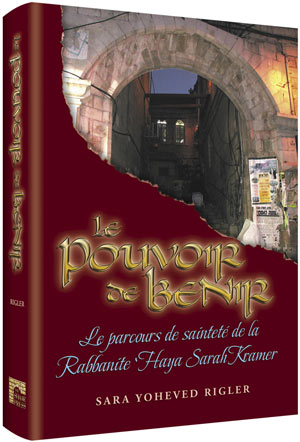
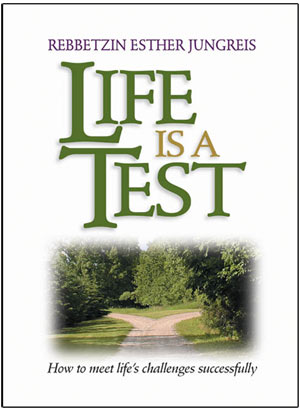
Rebbetzin Esther Jungreis' incredible best seller - Life Is A Test - is in the final stages of translation to Spanish.
Yet Another Cookbook in the Kosher by Design Series?
 Absolute fact! Susie Fishbein is rapidly finishing up her sixth culinary creation in the most popular kosher cookbook series ever published. Anyone concerned with healthy eating and cooking (that should be most all of us, no?) will love the delicious new recipes in Kosher by Design Lightens Up. Watch this blog for more news on the release of Susie's latest.
Absolute fact! Susie Fishbein is rapidly finishing up her sixth culinary creation in the most popular kosher cookbook series ever published. Anyone concerned with healthy eating and cooking (that should be most all of us, no?) will love the delicious new recipes in Kosher by Design Lightens Up. Watch this blog for more news on the release of Susie's latest. 


